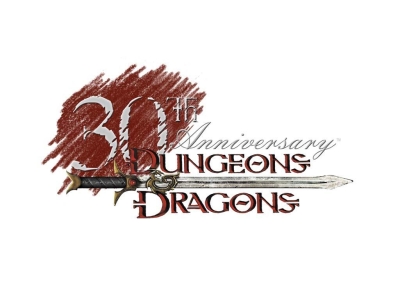Anyway, the point was that there's another definition of apology, and that definition is "a formal justification or defense."
I don't know formal you can consider it, but this is my defense of one of my favorite pastimes.

First of all, what is Dungeons & Dragons?
Well, for an in depth look you can click the D&D logo above or the link in the sentence before this one. Otherwise, you're going to have to live with just my take on it. First and foremost, D&D is a game. It's nothing serious. It's a diversion, a pastime. It's just fun! So what kind of game is it? I describe D&D as a game of cooperative storytelling. Each player is in charge of one character in the story, with the exception of one person who is in charge of, well, everything else. After all, the protagonists (think heroes) of the story don't and shouldn't know what the antagonists (villains) are going to do next! So there has to be one person who is in charge of the antagonists, the shopkeeps, the crowds on the streets, the mysteries and wonders to be found--all so the other players can have the sole responsibility of their one character. This is why D&D and games similar to it are known as Role Playing Games (or RPG's)--because each participant plays the role of a character in the story that all the participants are working together to tell. Remember when I said that there is one player who is responsible for the antagonists, etc?

In D&D that role is given the forbidding sounding name, "The Dungeon Master" (or DM)--and the term has a certain logic to it. After all, the DM is also the referee, he or she is responsible for working knowledge of the rules of the game, as well as being responsible for knowing what lies behind locked door #2 of the castle's dungeon. But I prefer the term presented by White Wolf: Storyteller.

How does one play? Well, just like any game, it would be easier to show you than it would be to describe it. There are books and books and more books chock full of rules for anything you could imagine your character wanting to do... and then some more. The beauty of the D&D rules system, tho, is that you can be very flexible. If you decide that your character leaps from the saddle of a charging horse in an attempt to tackle your opponent, then that's what your her or she does. There will be rules for that somewhere, or at least rules for something similar--and then a simple die roll determines how successful your character is.
So, if D&D is a fun, creative, collaborative game, why is it so vilified? Why does it have such a bad connotation for so many people? Why, for the love of God, is it associated with Satanism? Well, for one thing, there are certain socially and religiously conservative and extremely vocal sects of Christianity that view anything with a fantastic setting as Satanic. They have a such a huge problem with genre that they rarely get into content, let alone symbolism. When boiled down, most fantasy stories are about Good vs Evil, and personally I don't see why a Christian should have problems with that theme.
Another argument I've heard against the fantastic is that it is dangerous because people can loose their grip on reality. I personally have never met anyone who fits this description (and I've known a lot of gamers over the years) but I imagine that somewhere there's a mentally ill person who is lost in his or her own fantasies. I would argue, however, that such cases are not only rare, but that the genre is not a cause of the mental illness. So why does this theory have such a widely held belief, especially in reference to Dungeons & Dragons specifically? Two words: Rona Jaffe. You see, Rona Jaffe wrote the 1981 novel, Mazes and Monsters. The book, which claims to be based on a true story, was later adapted into a made for TV movie by the same name. The film featured a young Tom Hanks, and while few remember the film or the book, there are still persistent stories of "that guy that got killed in the steam tunnels while playing D&D." Well, the "true story" that the novel was based on was newspaper articles concerning the 1979 disappearance of James Dallas Egbert III from Michigan State University. He was very smart, was a computer expert, loved fantasy and played D&D. When he went missing, many people, including the media, theorized that he was killed or committed suicide in the steam tunnels under campus while playing D&D. Gruelling searches of the tunnels turned up nothing. In fact, James had simply run away, and was later found in Morgan City, Louisiana. There is no truth whatsoever to the story that he died in the steam tunnels while playing D&D.
 The fact of the matter is that Dungeons & Dragons recently celebrated its thirtieth anniversary. If the game were in fact dangerous to your mental health, it would never have made it this long. It is devil worship only in the same sense that C. S. Lewis was a devil worshiper (which is to say not at all). In point of fact, far from being harmful, D&D is collaborative, creative, and fun! It might not be for everyone, just like not everybody is a football player, or a chess player, or an actor.
The fact of the matter is that Dungeons & Dragons recently celebrated its thirtieth anniversary. If the game were in fact dangerous to your mental health, it would never have made it this long. It is devil worship only in the same sense that C. S. Lewis was a devil worshiper (which is to say not at all). In point of fact, far from being harmful, D&D is collaborative, creative, and fun! It might not be for everyone, just like not everybody is a football player, or a chess player, or an actor.But it's something I enjoy, it is not nor has it ever been counter to my faith or my calling, and I'm going to play when I can!
Be good to each other,
Rev. Josh
Storyteller and Dungeon Master



No comments:
Post a Comment